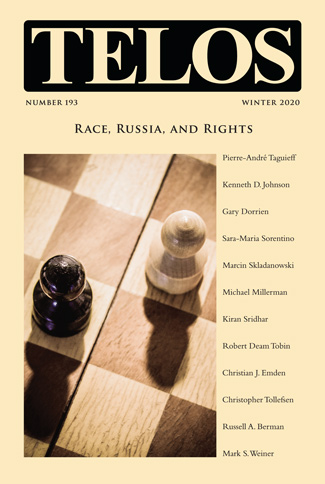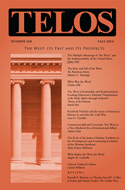By Telos Press · Thursday, March 18, 2021 To read more in depth from Telos, subscribe to the journal here.
In today’s episode of the Telos Press Podcast, Camelia Raghinaru talks with F. Cartwright Weiland about his article “Reflections of a Rapporteur,” one of a group of essays from Telos 192 (Fall 2020) on the U.S. State Department’s Commission on Unalienable Rights. An excerpt of the article appears here. If your university has an online subscription to Telos, you can read the full article at the Telos Online website. For non-subscribers, learn how your university can begin a subscription to Telos at our library recommendation page. Purchase a print copy of Telos 192 in our online store.
Listen to the podcast here.
Continue reading →
By Telos Press · Tuesday, February 9, 2021 In today’s episode of the Telos Press Podcast, Camelia Raghinaru talks with Christopher Tollefsen about his article “Some Further Thoughts on the Nature, Scope, and Source of Human Rights,” one of a group of essays from Telos 192 (Fall 2020) on the U.S. State Department’s Commission on Unalienable Rights. An excerpt of the article appears here. If your university has an online subscription to Telos, you can read the full article at the Telos Online website. For non-subscribers, learn how your university can begin a subscription to Telos at our library recommendation page. Purchase a print copy of Telos 192 in our online store.
Listen to the podcast here.
Continue reading →
By Jean-Marie Rouart · Monday, January 4, 2021 This essay appeared in Le Figaro on December 8, 2020, and this translation by Russell A. Berman is published with permission of the author. Hyperlinks are from the original, while footnotes have been added by the translator. Translator’s comments are here.
In the face of a very real Islamist threat that has led to violence and which the proposed law on “separatism” attempts to address, it is interesting to try to raise the level of the debate. It is necessary to inquire calmly into a question that worries those thinkers least inclined to emotional reactions. In contrast to a Christianity drained of its former ambitions, why is it that Islam has not given up its virulent proselytism and instead appears to pose a threat for the future?
This is a threat that de Gaulle already recognized in one of his extraordinary communications to Alain Peyrefitte, when he declared: “We are after all a European people of the white race, Greco-Latin culture, and the Christian religion.” And he considered Algerian independence necessary to prevent his village from being one day renamed “Colombey-the-two-Mosques”—which does not at all mean that he intended to exclude other “races” or religions. He understood France too well to endorse a narrow or xenophobic vision of it.
Continue reading →
By Russell A. Berman · Monday, January 4, 2021 Jean-Marie Rouart, a prolific French author and, since 1997, a member of the French Academy, published “Secularism is an Illusory Defense against the Islamist Will to Conquer,” in Le Figaro on December 8 and available in English translation here with the author’s permission. While the essay’s starting point is the challenge of Islamism in France and the efforts by the Macron government to address it, it explores a much wider matrix that includes the historical process of secularism, the status of Christianity in France (and, by extension, in the West more broadly), the role of tradition in national identity, and the imperative of the sacred in any culture. This complex array of ideas has implications far beyond France, yet it also indicates how today’s France has become ground zero for the cultural conflicts around secularization, Christianity, and Islam. To understand Rouart’s argument, one needs first to consider this specific context. What makes this topic urgent now?
Continue reading →
By David Pan · Friday, December 18, 2020 Telos 193 (Winter 2020): Race, Russia, and Rights is now available for purchase in our store. Individual subscriptions to Telos are also available in both print and online formats.
 What is not up for discussion? The answer to this question defines a political order, and the repressiveness of such an order will depend on where this boundary is set between the discussable and the undiscussable. But it is not as if more discussion necessarily means less repression. Certain topics—genocide, torture, slavery—definitely need to be off the table as legitimate political measures. Other topics—the choosing of rulers and historical facts—need to be discussable in order to avoid tyranny. In between lies a gray area whose definition will establish the character of each political order. Conversely, a lack of consensus on this issue will lead to political instability that goes beyond the content of political debates, indicating that the question of discussability coincides with the problem of political identity. This issue of Telos will consider three areas in which discussability has become the main issue, leading to implacable conflict. What is not up for discussion? The answer to this question defines a political order, and the repressiveness of such an order will depend on where this boundary is set between the discussable and the undiscussable. But it is not as if more discussion necessarily means less repression. Certain topics—genocide, torture, slavery—definitely need to be off the table as legitimate political measures. Other topics—the choosing of rulers and historical facts—need to be discussable in order to avoid tyranny. In between lies a gray area whose definition will establish the character of each political order. Conversely, a lack of consensus on this issue will lead to political instability that goes beyond the content of political debates, indicating that the question of discussability coincides with the problem of political identity. This issue of Telos will consider three areas in which discussability has become the main issue, leading to implacable conflict.
Continue reading →
By Russell A. Berman · Monday, September 15, 2014 Telos 168 (Fall 2014) is now available for purchase in our store.
 This special issue of Telos investigates the concept of the West. Far more than a geographical term, in intellectual, philosophical, and cultural history, it has been common to speak of a Western tradition in order to name lineages of thought from antiquity to the modern world. In cultural and political debates, Western values are invoked that are linked historically to a deep tradition specifically dedicated to desiderata such as freedom and individual dignity: at stake is the general possibility of any long-term tradition, the durability of culture over time, but also this very specific, distinctively Western tradition as the carrier of particular values. Politically this usage explains the reference to Western democracies (as opposed to the “peoples’ democracies” of the Soviet era) with the suggestion that democratic political forms and norms have emerged from the “Western tradition” and have generated the institutions of both liberal democracy, i.e., democratic procedures that assert popular sovereignty, while simultaneously protecting individual rights, and market economies shaped by the rule of law and the protection of private property. This special issue of Telos investigates the concept of the West. Far more than a geographical term, in intellectual, philosophical, and cultural history, it has been common to speak of a Western tradition in order to name lineages of thought from antiquity to the modern world. In cultural and political debates, Western values are invoked that are linked historically to a deep tradition specifically dedicated to desiderata such as freedom and individual dignity: at stake is the general possibility of any long-term tradition, the durability of culture over time, but also this very specific, distinctively Western tradition as the carrier of particular values. Politically this usage explains the reference to Western democracies (as opposed to the “peoples’ democracies” of the Soviet era) with the suggestion that democratic political forms and norms have emerged from the “Western tradition” and have generated the institutions of both liberal democracy, i.e., democratic procedures that assert popular sovereignty, while simultaneously protecting individual rights, and market economies shaped by the rule of law and the protection of private property.
Continue reading →
|
|

 This special issue of Telos investigates the concept of the West. Far more than a geographical term, in intellectual, philosophical, and cultural history, it has been common to speak of a Western tradition in order to name lineages of thought from antiquity to the modern world. In cultural and political debates, Western values are invoked that are linked historically to a deep tradition specifically dedicated to desiderata such as freedom and individual dignity: at stake is the general possibility of any long-term tradition, the durability of culture over time, but also this very specific, distinctively Western tradition as the carrier of particular values. Politically this usage explains the reference to Western democracies (as opposed to the “peoples’ democracies” of the Soviet era) with the suggestion that democratic political forms and norms have emerged from the “Western tradition” and have generated the institutions of both liberal democracy, i.e., democratic procedures that assert popular sovereignty, while simultaneously protecting individual rights, and market economies shaped by the rule of law and the protection of private property.
This special issue of Telos investigates the concept of the West. Far more than a geographical term, in intellectual, philosophical, and cultural history, it has been common to speak of a Western tradition in order to name lineages of thought from antiquity to the modern world. In cultural and political debates, Western values are invoked that are linked historically to a deep tradition specifically dedicated to desiderata such as freedom and individual dignity: at stake is the general possibility of any long-term tradition, the durability of culture over time, but also this very specific, distinctively Western tradition as the carrier of particular values. Politically this usage explains the reference to Western democracies (as opposed to the “peoples’ democracies” of the Soviet era) with the suggestion that democratic political forms and norms have emerged from the “Western tradition” and have generated the institutions of both liberal democracy, i.e., democratic procedures that assert popular sovereignty, while simultaneously protecting individual rights, and market economies shaped by the rule of law and the protection of private property. 

